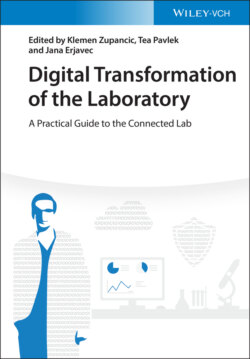Читать книгу Digital Transformation of the Laboratory - Группа авторов - Страница 29
1.3 Thoughts on LotF Implementation
ОглавлениеThe lab environment is changing – this is certain. New and existing science demands combined with critical issues of data management and reproducibility will require a strategic direction to be set and then deployed. It will be important for lab managers to identify what they want to achieve by employing the new approaches of AI, quantum computing, and advanced automation technology. Business ambition and needs, and the assessment of the maturity of organizations beyond the lab environment in the context of initiatives such as FAIR data, will need to be investigated as a matter of urgency to help drive lab of the future decision‐making. With such a pace of change it will be important to “think big” as well as be practical during implementation. Thinking in expansive terms, organizations must consider all the opportunities on offer within the key areas of technology, data, people, and process to highlight possible future visions and ways of working. They should use scenario planning to explore, influence, plan for, and manage the future. These scenarios will perhaps be most effective when they are personalized to the organization, function, lab, or team's future, rather than to a generic vision. The benefit of running pilots prior to fuller implementation in the LotF cannot be overstated. Small LotF pilots will allow experimentation across the broad themes. These will reveal what works and what needs adjustment based on the key lab environments. The successful use cases can result in new designs, collaborations, future partnering with technology groups, and new predictive models to support experiments in a timely manner. Moving beyond these smaller pilots and the learnings from them will help catalyze organizational change to support a lab environment that can adapt to new science and get the most from data, digital technology, and AI‐driven transformations. All these changes will present new business opportunities, the chance for new relationships with vendors, and the need for new business partners. They will also present opportunities for all lab colleagues to take part in the transformation and to take on new roles and skills to support the implementation and future impact.
